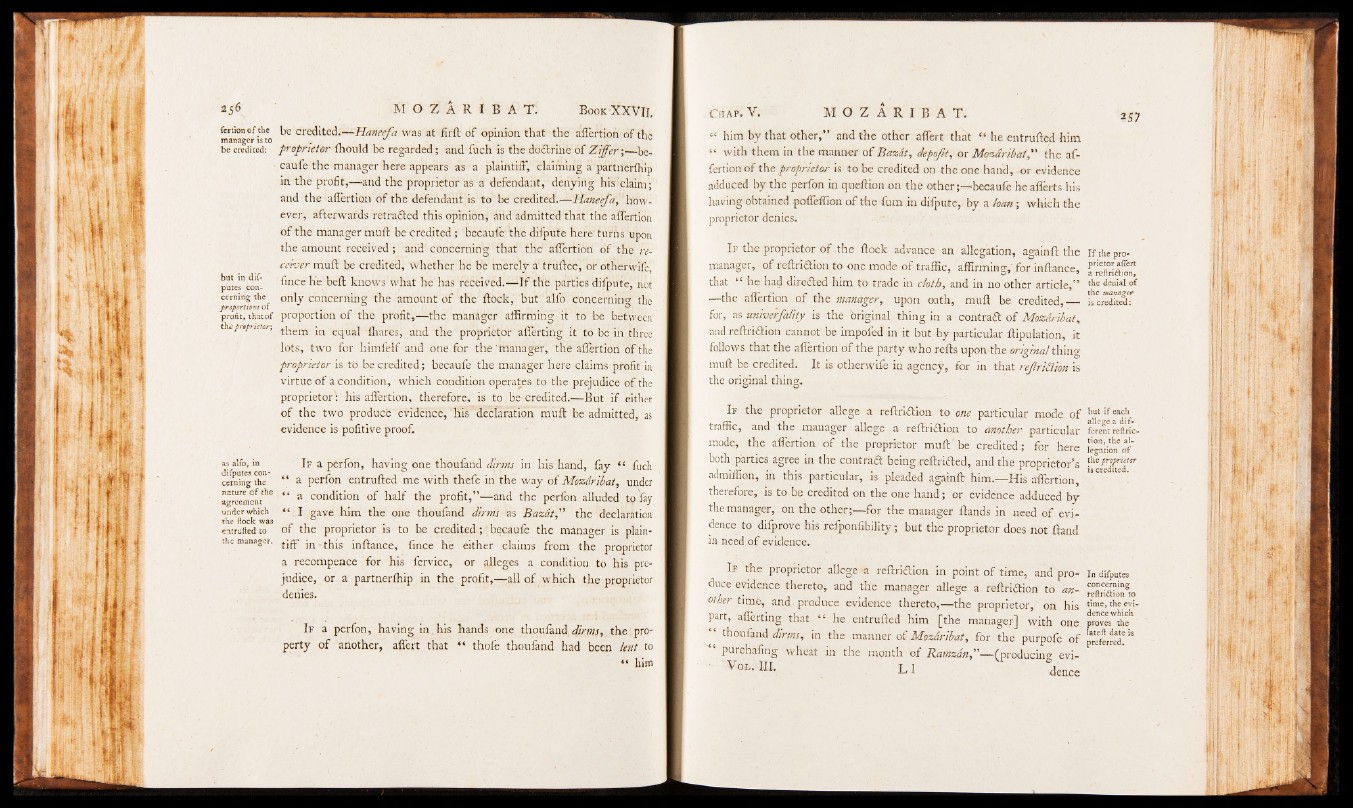
fertionof the
manager is to
be credited:
but in disputes
concerning
the
proportions o f
profit, that of
the proprietor;
as alfo, in
difputes con*
cerning the
nature o f the
agreement
under which
the ftock was
entrufted to
the manager.
be credited.— Haneefa was at firft of opinion that the afiertion of the
proprietor fhould be regarded ; and fuch is the doflrine of Ziffer-,— be-
caufe the manager here appears as a plaintiff, claiming a partnerfhip
in the profit,— and the proprietor as a defendant, denying his'claim;
and the affertion of the defendant is to be credited.— Haneefa, however,
afterwards retraced this opinion; and admitted that the afiertion
o f the manager muft be credited ; becaufe ’the difpute here turhs upon
the amount received ; and concerning that the1 affertion of the receiver
muft be credited, whether he be merely a' truftee, or otherwife,
fince he bell knows what he has received.— I f thfe parties difpute,‘iiot
only concerning the amount of the flock, but alfo concerning the
proportion of the profit,— the, manager affirming it to be between
them in equal fhares, and the proprietor afferting. it to be, in three
lots, two for himfelf and one for the manager, the affertion of the
proprietor is to be credited; becaufe the manager here claims-profit in
virtue of a condition, which condition operates to the prejudice of the
proprietor' his affertion, therefore, is to be credited.— But if either
of the two produce ' evidèiice, his’ declaration muft be admitted, as
evidence is pofitive proof.
If a perfon, having one thoufand dirms in his hand, fay “ fuch
“ a perfon entrufted me with thefe in the way of Mozdribat, under
“ a condition of half the profit,”— and the perfon alluded tp'fay
“ I gave him the one thoufand dirms as Bazdt," the declaration
of the proprietor is to be credited; becaufe the manager is plaintiff
in-this inftance, fince he either claims from the proprietor
a recompence for his fervice, or alleges a condition to his prejudice,
or a partnerfhip in the profit,— all of which the proprietor
denies.
It a perfon, having in.his hands one thoufand dirms, the property
of another, affert that “ thofe thoufand had been lent to
“ him
“ him by that other,” and the other affert that “ he entrufted him
“ with them in the manner of Bazdt, depojit, or M o z d r ib a tfhe affertion
of the proprietor is to be credited on the one hand, or evidence
adduced by the perfon in queftion on the other;—becaufe he aflerts his
having obtained poffeffion of the fum in difpute, by a loan; -which the
proprietor denies.
If the proprietor of the flock advance an allegation, againft the
manager, of reftriaion to one mode of traffic, affirming, for inftance,
that “ he had dii-eded him to trade in cloth, and in no other article,”
—the affertion of the manager, upon oath, muft be credited,—
for, as univerfality is the original thing in a contraft of Mozdribat,
and reftriaion cannot be impofed in it but by particular ftipulation, it
follows that the affertion of the party who refts upomt'he original thing
muft be credited. It is otherwife in agency, for in that rejlriaion is
the oriog inal thingo.
If the proprietor allege a reftriaion to one particular mode of
tiaffic, and "the manager allege a reftriaion to another particular
mode, the affertion of the proprietor muft' be credited; for here
both parties agree in the contraa beinga-eftriaed, and the proprietor’s
admiffion, in this particular, is pleaded againft him.—His affertion,
therefore, is to be credited on the one hand; or evidence adduced by
the manager, on the other;—for the manager Hands in need of evidence
to difprove his refponfibility; but the proprietor does not ftand
m need of evidence.
If the proprietor allege a reftriaion in point of time, and produce
evidence thereto, and the manager allege a reftriaion to another
time, and. produce evidence thereto,—the proprietor,’ on his
part, aflerting that “ he entrufted him [the manager] with one
“ thoufand dirms, in the manner of Mozdribat, for the purpofe of
“ purchafing wheat in the month of Rarnzan,"—(producing evi-
M l i E H
I f the proprietor
affert
a reftri&ion,
the denial of
the manager
is credited:
but if each
allege a different
re ft notion,
the allegation
o f
the proprietor
is credited.
In difputes
concerning
reftri&ion to
time, the evidence
which
proves the
lateft date is
preferred.